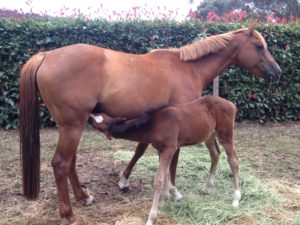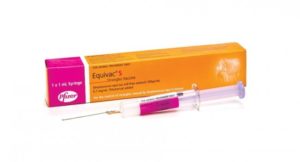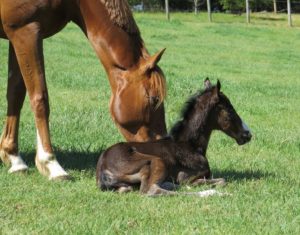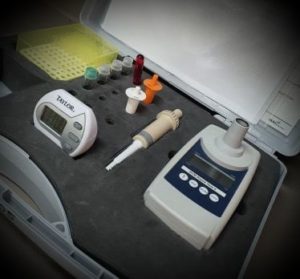 As we focus on staying warm during the winter months it is easy to forget that spring is just around the corner. With spring comes the imminent arrival of lots of little hoof beats in the Macedon Ranges and surrounding areas. So, have you finished your homework?
As we focus on staying warm during the winter months it is easy to forget that spring is just around the corner. With spring comes the imminent arrival of lots of little hoof beats in the Macedon Ranges and surrounding areas. So, have you finished your homework?
Prior to the safe arrival of a foal, the mare and you must be fully prepared. How do you determine whether you have prepared the mare? Create and use your own check list relating to the mares health or use the one below to determine whether your mare is healthy and prepared for the arrival of her foal. If you cannot answer yes to all these questions or feel uncertain about your mares status, a health check and assessment by a veterinary professional may be required. (These questions may also serve as a guide, when you are purchasing a broodmare, when questioning vendors)
→Is the mare in good health?
→Using a body condition score is my mare the correct weight?
→What is my mares previous foaling history?
⇒ Has she had mal-presentations previously?
⇒ What is the mare udder development prior to foaling?
⇒Does the mare have a history of running milk prior to foaling?
⇒ Has she previously retained her membranes?
→What is the mare current pregnancy history?
⇒ Has she had any disease or injury?
⇒ When was her last day of service?
⇒ Is she caslicked?
⇒ Is she currently receiving any medications?
→Is her dental care/ hoof care up to date?
 →Has she had the correct vaccines?
→Has she had the correct vaccines?
⇒ Tetanus/ Strangles/ EHV1-4/ Rotavirus?
→Does her current diet reflect her current nutritional needs?
⇒ Is she receiving to much/ not enough?
⇒ Is the energy, protein and mineral ratio matched to her needs?
With the mare taken care of, you need to assess your facilities, knowledge and ability to deal with the mare foaling at home with you. Or is she best to go to a stud operated by staff who have the experience and knowledge. To be able to make an informed decision take the time to research the type of environment required to reduce all unnecessary risks in foaling a mare down, what monitoring and support the mare may require during the process, what the sequence of events is NORMAL during the foaling process and what after care of the mare and foal is required to ensure a successful outcome. In other words do your research NOW, in the lead up to foaling so you have a great chance of it being a happy outcome.

With the decision made to renovate or modify a paddock or yard on farm to be foal friendly; pasture, fencing and lighting and importantly general cleanliness. You will need to ensure you also prepare necessary equipment and yourself for the foals arrival. A foaling kit prepared well ahead of time ensures that your not searching for materials and equipment when time is of the essence during delivery. Don’t forget a pen and paper, it is easy to loose track of or misrepresent time, when stressed during the delivery process. Contact your veterinarian to get a list as to what they recommend to have in the kit.
Whilst in consultation with the veterinarian about the foaling kit, discuss with them the stages of labour and get to know the normal sequence of events and what complications can occur during each of these stages, 1st stage labour, 2nd stage labour; delivery and 3rd stage labour; passing of membranes. Each stage has complications that can have life threatening consequences. During the foaling process if you have any doubts at all, call the vet immediately. After monitoring your mare and watching the arrival of you new family member, it is then important that you assess the health status of your newborn foal.
Again do your research NOW and know what the normal stages for a foal are after birth;
Is the foal breathing?
How do you do emergency resuscitation if they are not?
When should a foal stand? When should a foal begin to nurse?
Knowing the answer to these questions and more, will ensure that any problems encountered will be recognized and dealt with early. Remember if you must at any stage touch a newborn foal, all materials such as towels and equipment such as examinations gloves must be unscented.
Foals are born with NO immunity. Immunity is security against disease, and the non-susceptibility of the bodies systems to invasive or pathological effects of microorganisms. To provide security against diseases the body produces antibodies in recognition of diseases that it has previously been exposed to. Passive immunity is received by the foal in the form of antibodies in the colostrum, from the mare. As such, protection from disease is dependent on receiving adequate amounts of quality colostrum. Testing of the mares colostrum for quality and quantity is a useful pointer in determining whether passive transfer is taking place. To ensure that passive transfer is successful a blood sample from the foal is taken to measure the actual level of antibodies that the foal has in its system, this test is know as an IgG test. With the foal receiving sufficient amounts of IgG and demonstrating normal behaviour and the mare moving through all stages of labour and is demonstrating normal behaviour, it is time to sit back and admire your new addition to the family.
So now is the time for revision, if you have read this article and in getting to the end you can honestly say that;
; Your mare is in good health,
; Your facilities and equipment have been prepared for the foaling event,
; You understand the normal stages of behaviour for the mare and foal prior’ ‘during’ and ‘post’ foaling
; You have help and a plan in case of an emergency, then you can sit back in front of the warm fire and wait out the cold winter months knowing your mare and you are prepared.
If you have instead ended up with a page full of questions, that you don’t have the answer for, then take the time now, to consult Gisborne Veterinary Clinic on (03) 54 282805 and gather the information you need, so you and your mare can look forward to the delivery of her foal.



